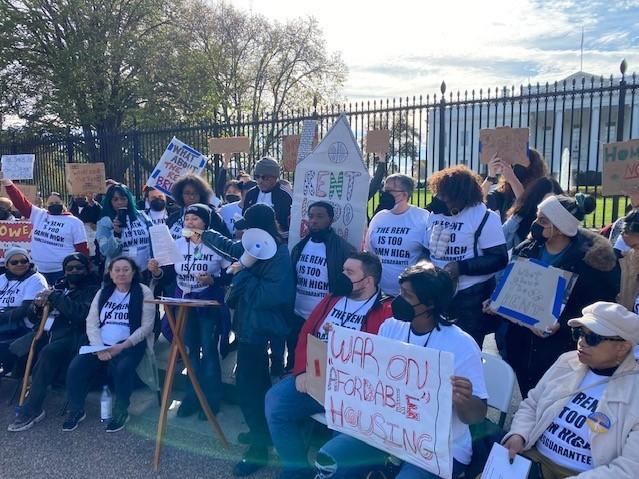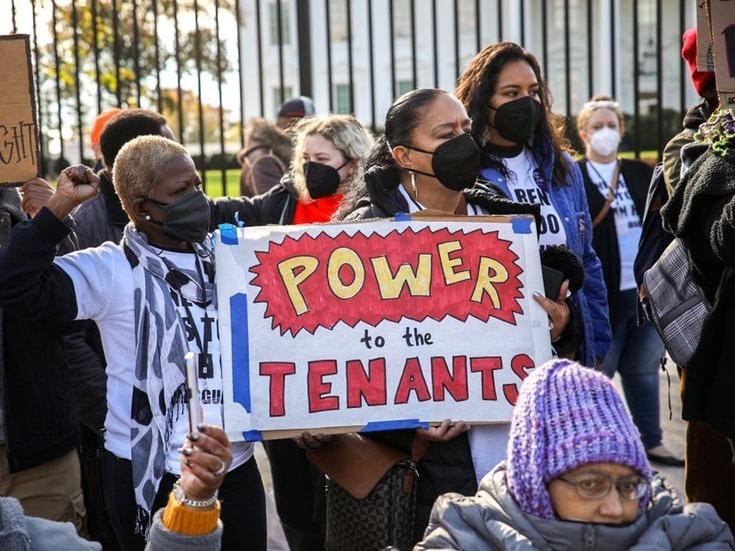Section Branding
Header Content
Rent control expands as tenants struggle with the record-high cost of housing
Primary Content
Last spring, a month after an out-of-state investor bought the apartment building where LaMonica Dickerson lives in Louisville, Ky., she and more than 100 others got an eviction notice. If she wanted to stay, she was told her rent would be $500 higher.
"They're forcing homelessness," she says. "Married couples are having to split because they don't have anywhere to go together."
Dickerson negotiated to stay put and pay only $200 more a month, but if rents rise again when the lease is up next year, she doesn't know what she'll do.
"I was going to go back to Nashville, and when I saw the rent in Nashville — because that's my home, I love Nashville — it broke my heart."
Dickerson is part of a vibrant tenants' rights movement that has revived a push for rent control, fueled by anger and desperation after years of rent hikes that have outpaced wages and inflation. This month, voters in Florida, Maine and California approved ballot measures to impose or tighten caps on rent hikes.
This expansion is happening despite years of research that shows rent control can actually reduce the overall amount of affordable housing, and may not help those who need it most. But supporters say solutions for the housing crisis take years to play out, and people at risk of eviction or even homelessness need help now.
To that end, Dickerson recently joined dozens of other tenants from around the country who converged on Washington, D.C., to lobby Biden administration domestic and economic policy officials. In addition to strengthening tenant protections, the group has suggested an executive order to set rent caps on federally backed mortgages and subsidized housing.
"We need universal rent controls in this country, and we actually need the federal government to champion them," says Tara Raghuveer of the advocacy group People's Action, which organized the trip.
Raghuveer argues that federal action is needed because many states largely ban cities from enacting rent control (though often with exceptions and possible workarounds.) She also cites the growing share of housing bought by institutional investors.
"They own properties in Kentucky and Missouri and Illinois and California, and therefore they need to be regulated by federal law," she says.
It's not clear the Biden administration agrees with that, or would have such legal authority. But more states and cities are debating rent control and taking action.
Rent control is both controversial and politically popular
Jim Lapides, with the National Multifamily Housing Council, tracked 19 state legislatures that had rent control proposals this year — nearly all of them to expand it. Combined with local measures, he says it's the most he's seen in working on the issue for a decade.
Lapides understands the appeal of what seems like a quick, easy fix, but says this is not it.
"It's a shame, because rent control attempts to address the symptoms of the problem while making the core issue worse," he says.
That core issue is a shortage of millions of homes and apartments. It began when construction plummeted after the 2008 housing crash, and it's led to historically low vacancy rates that have helped drive up rents most everywhere. Lapides says capping rents does not add to the housing stock, discourages developers from building in that market, and over the longer term can actually lead to fewer affordable units.
"Either they go into disrepair and fall to obsolescence because they don't have the resources to reinvest into those units, or they get converted to other uses," he says. "Maybe they're converted to condos, or even not residential at all."
That's the dilemma landlord Brit Vitalius is facing in Maine, now that Portland voters approved a ballot measure to tighten that city's rent cap to 70% of the consumer price index — a rough measure of inflation. Vitalius heads the Rental Housing Alliance of Southern Maine and also rents out 30 places.
"I have some vacant units right now. I'm trying to decide what to do with them," he says.
He expects to keep renting; Portland's new measure imposes a $25,000 fee if landlords convert property to a condo. But normally, Vitalius says he'd use a vacancy to upgrade kitchens and bathrooms, maybe replace a worn, clawfoot bathtub in a century-old home.
"I take great care of my tenants," he says. "But there is no reason that I can justify putting any more money into these buildings. The market is hot, I don't have to do anything, and I'll get the rent that I get."
On the other side of the country, voters in Pasadena, Calif., also passed rent control, along with measures to make it harder to evict people.
Tenant activist Jane Panangaden says the state already caps rent, but not enough to keep it from rising higher than the rate of inflation. Now Pasadena will limit hikes to 75% of the consumer price index.
The aim is that, over time, a smaller share of people's income will have to go toward housing.
"And that will hopefully create a lot more stability," Panangaden says, "because right now, tenants are moving, you know, every two or three years as the rent goes up."
Rent control helps some people, but more is needed
Research shows rent control does keep people from being displaced.
But to actually create more affordable places to live, housing experts say cities will need to do something else that's not as politically popular: eliminate single-family zoning laws, many designed decades ago to prevent Black residents from buying in certain neighborhoods, and allow for denser housing. Then, build lots of it.
A number of cities and states have taken steps to make this happen, though it's too early to assess the impact.
Housing experts also say far more public funding is needed to create housing for the lowest-income renters. This month, despite struggling under the sting of inflation, voters around the country approved raising taxes to build, preserve and subsidize more affordable housing.
Analysts say the meteoric rise in rents has slowed for the moment. But fixing the historic housing shortage — especially affordable housing — remains a long-term solution. In the meantime, both supporters and opponents expect more places to consider rent control for those struggling to avoid displacement or eviction.
Copyright 2022 NPR. To see more, visit https://www.npr.org.
Bottom Content





